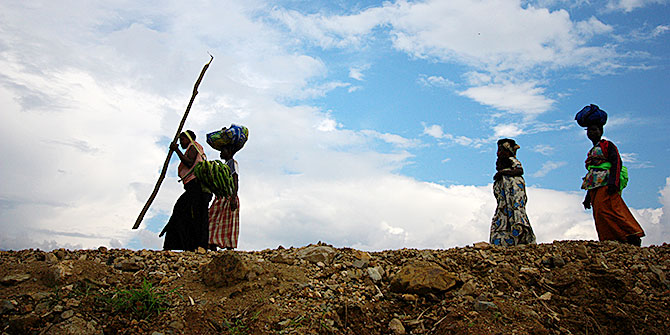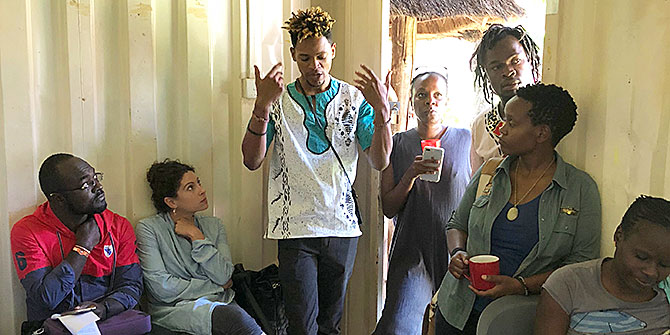Giuseppe Loprete unveils the experiences and motivations of migrants travelling through Niger on their way to Europe.
This post is part of our series African Perspectives on Migration looking at the theme of irregular migration.
Every week in Agadez, a desert town located in the heart of Niger, hundreds of migrants organise their transportation to Libya or Algeria. They are Senegalese, Malians, Gambians, Nigerians, Ghanaians, Ivorians. Endless convoys bring them from Agadez to Dirkou, Seguidine, Madama then Southern Libya. Others rent pick-ups with drivers to cross the Algerian border. Hundreds of individuals crossing each week translate into hundreds of thousands over the course of a year. The International Organization for Migration (IOM) estimates 120,000 in 2015 alone have crossed Niger. From Agadez, each vehicle carries 25-30 people and a single convoy can reach 100 vehicles, even 200, every week.

Migration is a business which represents millions of dollars in revenue circulating in the informal economies of countries along select routes. Migrants claim that in order to cross the Agadez region they pay between 300 to 700 euros, 750,000 to 1.75 million euros per week. Roughly. Cash. Not taxed. In addition, thousands of euros per individual are spent from their savings and loans in order to reach Niger, lodge in Libya and cross over the Mediterranean.
These factual observations lead us to several considerations.
- Irregular migration has rapidly become the main generator of livelihoods for local communities in Niger and other transit countries. Compared to the level of funding generated by this economy, plans proposed via foreign aid through trust funds and multilateral and bilateral cooperation look like pocket money for these communities. Simply stated, the value of the trade is higher than the value of proposed solutions.
- Migrants have little or no perception of the reality of migration in concrete terms whether it is the danger of the journey, the lack of jobs ambiguity of their legal status, or their acceptance in a country with a culture vastly different than their own. For them, the main objective is to reach Italy, Europe or at least Libya or Algeria. They aim for a better life, escaping poverty, and a host of new opportunities at their fingertips. The question of how their dreams will be achieved rarely concerns them. A recent survey carried out by IOM in Niamey and Agadez bus stations confirms that 74% of migrants have no information concerning the journey ahead. They do as they are told by smugglers.
- While many refugees from Syria now traveling through the Balkans take their families with them, migrants from West Africa travel alone, carrying with them the weight of the expectations of their families, mothers, wives, and villages. Social pressure forces people to migrate and the stigma associated with returning home empty-handed without money or jobs rules out the option of failure for many migrants. In the IOM centre in Agadez, where 8000 migrants have transited in 2015, migrants are afraid to call home to inform their families of their return. Some call a friend or a relative to inform the families indirectly to ask for permission to go home while others simply do not call at all.
Economic, social and cultural factors strongly affect the individual’s choice to migrate. Migrants are aware of the risks, they know they can die in the desert or in the sea as many have family members who perished in detention camps in Libya or on their journeys through the Sahara. One migrant told us during an interview in the transit centre “I’m here because when my older brother died in the Mediterranean my mother said that now it is my turn to go.”
In many countries throughout West Africa, migration seems to have replaced the ancient rite of passage into the adulthood. Gambians transiting through Niger are often as young as 16 years old. From Senegal and Guinea Conakry young students want to reach French schools. Among those most scared to return home are migrants who have sold their cows or plots of land, only to return carrying nothing but their failure.
In Zinder, a region bordering Nigeria in Southern Niger, the best houses made with bricks and solid roofs belong to men whose wives or daughters have sent back their remittances from Algeria. These women, promised small jobs by middle men, find themselves forced into prostitution once across the border in Algiers and other major cities, their children and those “rented” by other families, begging in the streets. As is so often the case, efforts to seek a better fortune abroad commonly produces victims of trafficking.
The philosophical proposition cogito ergo sum by Descartes in our modern times turns into a new migro ergo sum. Families, entire communities, peers – the pressure comes from all angles and young Africans cannot resist, they have to migrate if they want to ‘be.’
An exodus which moves billions of euros, channelled by informal networks, drains a significant amount of the resources of these communities which is spent on transit and living expenses in destination countries. The Sahel is one of the most affected regions of desertification and extreme climate change, extremist groups control vast areas of the region including natural resources along the migratory routes, and against this dramatic background, the Nigerien population is young (50% below 16 years old) and rapidly growing (30 million expected in 2040, from the current 18.5 million). Other countries in the region show similar trends. Given the political, economic, and physical climate, the current pace of migration in the so-called Central Mediterranean route, is at risk of acceleration, rather than slowing down as stakeholders in the regulatory process in Europe would expect or hope.
When addressing the drivers of migration, all the aforementioned aspects must be taken into account: the growing informal economy nourished by irregular migratory flows; the role of migration as a coping mechanism for families and communities at risk of extreme poverty; the individual and psychological dimension of these young migrants. Migration is more than a passage to a paycheck, it embodies the culture of a region where youth migrate in order to ‘be.’
Giuseppe Loprete is the Chief of Mission at the International Organization for Migration in Niger. Follow him on Twitter @beppelop.
Read more articles from our series, African Perspectives on Migration
The views expressed in this post are those of the author and in no way reflect those of the Africa at LSE blog or the London School of Economics and Political Science.






